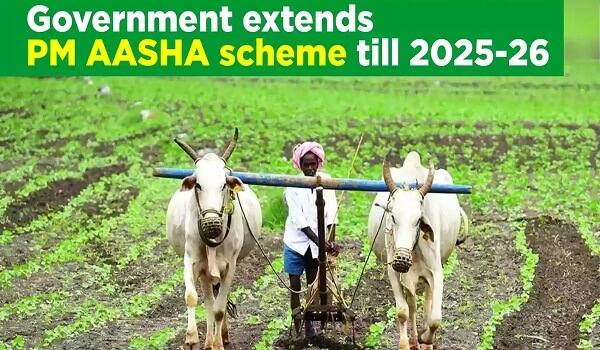The Central Government has approved the continuation of the Pradhan Mantri Annadata Aay Sanrakshan Abhiyan (PM-AASHA) scheme till 2025-26 during the 15th Finance Commission cycle. The scheme was launched in 2018 as a comprehensive scheme to ensure minimum support price (MSP) to farmers, especially for pulses, oilseeds and copra. It aims to ensure remunerative prices for farmers and price stability in the agriculture sector.
Key components of PM-AASHA
Price Support Scheme (PSS):
- Government procurement of pulses, oilseeds and coconut is done at MSP.
- Central Nodal Agencies (CNAs) operate the procurement process in collaboration with state agencies.
- Only produce meeting the “Fair Average Quality” (FAQ) standards is procured.
Price Deficiency Payment Scheme (PDPS)
- Farmers are directly compensated for the difference between MSP and market price.
- Farmers are required to register in advance.
- Applicable to oilseeds, but does not involve physical purchase of produce.
- Implementation under transparent auction process in notified mandis.
Private Procurement & Stockist Scheme (PPSS) (on pilot basis)
- States allowed to involve private stockists in the procurement of oilseeds.
- Applicable in selected Agricultural Produce Market Committees (APMCs) or districts.
Achievements of PM-AASHA Scheme
Expansion of procurement operations
- Approval for 100% procurement of Tur, Urad, and Masur under PSS in 9 states for Kharif 2024-25 season.
- Government procurement was increased to ensure MSP benefits to farmers.
Procurement Target
- Target to procure 13.22 lakh metric tonnes (LMT) of pulses.
- In many states, farmers got the benefit of higher procurement on MSP.
Benefits to farmers
- So far 12,006 farmers have received direct benefits.
- Purchase of 0.15 LMT Tur in Andhra Pradesh, Karnataka, Maharashtra and Telangana.
- Direct procurement ensures increase in farmers’ income and price stability.
Market stability and reduction in imports
- Market price instability was prevented by maintaining buffer stock.
- Import dependence reduced by encouraging domestic production.
- Pulses were made available to consumers at reasonable prices while ensuring food security.
Benefits of PM-AASHA Scheme
- Ensured fair prices for farmers
- Boost rural economy
- Reduced import dependency
- Market stability
- Reduced storage and procurement costs
Concerns
- Limited implementation: PDPS and PPSS have been poorly adopted by states.
- Procurement constraints: MSP coverage is not uniform across crops and regions.
- Awareness and access issues: Many farmers lack awareness or face bureaucratic hurdles in registration.
- Budget concerns: Ensuring adequate funding for procurement operations remains a challenge.

